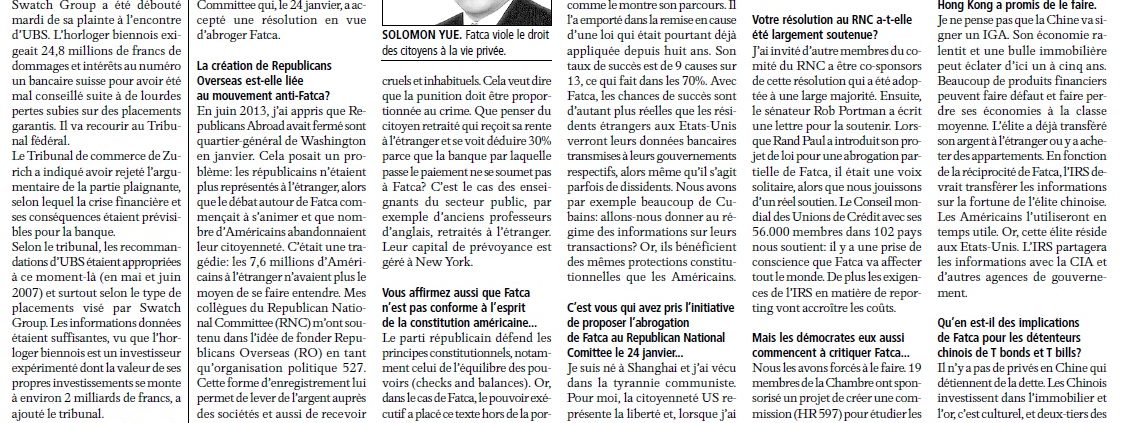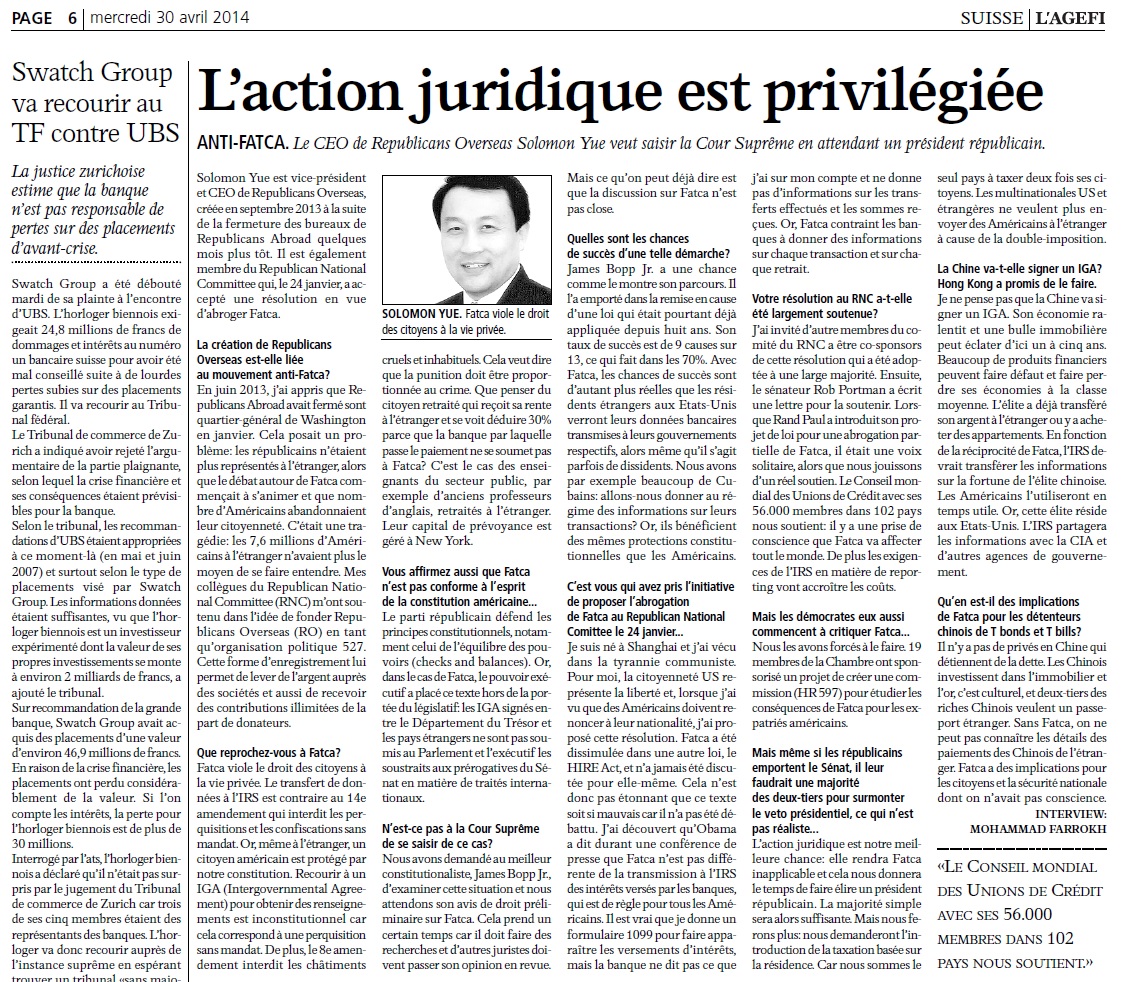Interview with Swiss Financial Newspaper Lágefi on FATCA in Franch
Dear Oregon Republican Party State Central Committee members,
The following English translation has been posted on Republicans Overseas Facebook. During the interview, I did share my thoughts on our legal option for FATCA with Mr. Farrokh.
Thanks,
Solomon
Journalist Mohammad Farrokh of Swiss Financial Newspaper L’agefi interviewed Solomon Yue, Vice Chairman and CEO of Republicans Overseas regarding potential legal option for FATCA translated by Keith Redmond, Treasurer of Republicans Abroad France.
L’action juridique est privilégiée
Legal Action Is Preferred
Wednesday 30 April 2014-04-30
Anti-FATCA. The CEO of Republicans Overseas Solomon Yue wants to go to the U.S. Supreme Court while waiting for a Republican president.
Solomon Yue is Vice Chairman and CEO of Republicans Overseas, created in September 2013 following the closure of the Republicans Abroad DC headquarters a few months prior. Yue, who is also a member of the Republican National Committee, pushed through on 24 January an RNC resolution to repeal FATCA.
The creation of Republicans Overseas is linked to the anti-FATCA movement?
“In June 2013, I learned that Republicans Abroad closed its headquarters in Washington D.C. in January. This posed a problem as Republicans no longer represented American citizens abroad. Specifically during the time that FATCA has become a major issue, resulting in many Americans renouncing their citizenship. It is a tragedy that 7.6 million Americans residing overseas have no voice regarding FATCA. My colleagues of the Republican National Committee (RNC) supported me in the founding of Republicans Overseas (RO) as a 527 political organization. The status permits the organization to raise unlimited contributions from corporations as well as individual donors.”
What is wrong with FATCA?
“FATCA violates citizens’ right to privacy. Personal financial data transfered from foreign banks to the IRS violates the 14th Amendment which prohibits unreasonable searches and seizures without a warrant. However, even living abroad, a U.S. citizen still is protected by our Constitution. Using an IGA (Intergovernmental Agreement) between the U.S. government and a foreign government as a license for a warrantless search is unconstitutional. In addition, the 8th Amendment prohibits cruel and unusual punishment. This means that the punishment must be proportionate to the crime. Just imagine a retired American citizen who receives his monthly pension check abroad and the IRS withholds 30% of the check because his foreign bank, through which the fund transfer is made, is not FATCA compliant? This could happen to a public school teacher, who taught English and retired abroad. His pension is managed by a U.S. bank in New York.”
You also say that FATCA is not consistent with the spirit of the U.S. Constitution…
“The Republican Party defends constitutional principles, including the balance of powers known as checks and balances. However, in the case of FATCA, the executive branch has usurped the legislative branch’s treaty power: the IGAs that are signed between the U.S. Treasury Department and foreign governments should be subject to the U.S. Senate’s review and approval.”
Will the Supreme Court take this case?
“We asked the best constitutional litigator in the U.S., James Bopp Jr., to examine this FATCA case and we are waiting for his preliminary legal opinion on the FATCA law. It will take time and other lawyers must review the legal opinion. But what we can already say is that the issue of FATCA is not closed.”
What are the chances of success with this legal approach?
“James Bopp Jr. brought down significant portions of the McCain-Feingold Campaign Finance Reform Act after it has been already in force for eight years. His winning record in the U.S. Supreme Court is 9 out of 13 cases. FATCA also violates foreign passport-holding U.S. residents’ constitutional protections because their bank information will be sent to their respective governments. Some of them could be dissidents. Do we want to give Cuban refugees’ financial information to their government? No, they should enjoy the same constitutional protections as Americans.”
It is you who have taken the initiative to propose the repeal FATCA at the Republican National Committee on January 24…
“I was born in Shanghai and lived under Chinese Communist tyranny. For me, U.S. citizenship is freedom and when I read that Americans were forced to renounce their citizenship, it hit a raw nerve. I proposed this RNC resolution to repeal FATCA. FATCA was hidden in part of the HIRE Act and was not debated in the Congress. Therefore, it is not surprising that the law was so poorly written. I also discovered that Obama lied during a press conference that saying FATCA is no different from the IRS requiring Americans to report their 1099 interest earnings paid by their banks in this country. It is true that I receive a 1099 form from my bank to show interest earnings, but the bank is not required to report how much money I have in my account, information on transfers and the amounts received. However, FATCA forces foreign banks to provide their American clients’ account information on account balance and each transaction and each withdrawal to the IRS.”
Your RNC resolution to repeal FATCA was widely supported?
“I invited other members of the RNC to be co-sponsors of the resolution which was adopted by a large majority. Then Sen. Rob Portman wrote a letter on behalf of the National Republican Senatorial Committee in support of it. When Sen. Rand Paul introduced his bill for a partial repeal of FATCA, he was a lone voice. Now we enjoy broader support. The World Council of Credit Unions, with 56,000 members in 102 countries, supports us: there is a realization that FATCA will affect everyone. In addition, the IRS requirements regarding reporting will increase costs of doing business for foreign and U.S. banks.”
But Democrats have also begun to criticize FATCA…
“We forced them to do so. 19 Democrat members of the House co-sponsored a bill to establish a commission (HR 597) to study the impact of FATCA on American expatriates.”
But even if the Senate Republicans take back the majority, you need a two-thirds majority in both chambers to overcome a presidential veto, which is not realistic…
“Legal action is our best chance: it will make FATCA void and that will give us time to elect a Republican president and maintain a simple majority in both chambers in 2016. By then we will do more: we will introduce residency-based taxation reform, in addition to repeal FATCA. We are the only developed country to tax its overseas citizens twice. U.S. and foreign multinationals do not want to send Americans abroad because of the double taxation.”
Will China sign an IGA since Hong Kong has promised to do so?
“I do not think that China will sign an IGA. China’s economy is slowing and the housing bubble may burst within one to five years. Many Chinese trust products may default. The Chinese middle class could lose their life savings as a result and will want to blame someone. The Chinese Communist corrupt elite have already transferred their ill-gotten money abroad or currently buy apartments in the U.S. FATCA’s reciprocity allows the IRS to collect personal financial data of those elite’s extensive hidden holdings of assets in the U.S. The IRS will share this information with the CIA and other government agencies as well as leaking it to the media. The Chinese Communist government does not want its citizens to know about this kind of official corruption.”
What are the implications of FATCA vis-à-vis Chinese who hold T- bonds and T bills?
“The wealthy Chinese Communist elite are not likely to hold U.S. Treasury instruments. They would more likely invest in real estate and gold. It’s cultural. Also, two-thirds of rich Chinese want a foreign passport. Without FATCA, no one would know the details of Chinese citizens’ hidden assets overseas. FATCA has implications for Green Card holding foreign citizens in the U.S. and national security of foreign counties that no one has considered.”
Interview:
Mohammad Farrokh
Journalist
Swiss Financial Newspaper L’agefi


